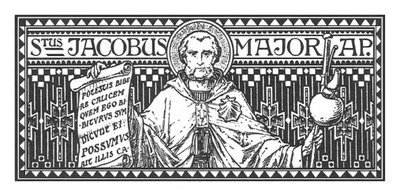Today we celebrate the great feast of Saint James ‘the Greater’, not because of any intrinsic superior quality to the other apostle James, ‘the Lesser’, traditionally held to be the author of the New Testament epistle, whom we venerate with Saint Philip on May 3rd, but likely because this James was older.
Today’s James was the brother of Saint John the Evangelist, together described by Christ as boanerges, the ‘sons of thunder’, for reasons that are obscure, but may have something to do with their zeal and fiery temperaments. They’re the ones who ask that Our Lord to send fire from heaven to burn the ‘unrepentant’ – the Samaritans who refused them hospitality. Their zeal would soon be tempered by the patient example and teaching of the Son of God.
James seems to have been the first of the Apostles martyred for the Faith, being ‘killed by the sword’ at the command of Herod Agrippa (Acts 12:2). According to tradition, he also evangelized Spain, where his relics were placed, since ancient times the site of one of the greatest of pilgrimages from the days of the early Church, the Santiago de Compostella, from France, and 582 miles through the Pyrenees and northern Spain, to that ‘field of stars’, at the edge of the Atlantic Ocean. How many graces have flowed from following the steps of Saint James, we will never know, at least before eternity.
Saint James has also been invoked in the ongoing battle (to this day!) against Islam, who, in their own desire for conquest, also took over Spain beginning in the 8th century. The ‘Moors’, as they were called in Europe, controlled the Iberian peninsula (that is, all of modern Spain and Portugal) until the reconquista in the late fifteenth century under Ferdinand and Isabella. The Christian soldiers invoked the assistance of Saint James, whom they termed Santiago Matamoros, Saint James, the Moor Slayer. As mentioned in other posts, we should not think of ‘war’ first and foremost in such physical terms – at least, not until a last resort – but rather in terms of spiritual combat, in that conquest for minds and hearts, for souls converted to the Truth, which will truly set them free.
On that note of truth, ’tis indeed providential that Saint Pope Paul VI chose to promulgate the ‘thunderous’ encyclical Humanae Vitae on this day in that fateful year of 1968, with the sexual revolution at its zenith. Short, clear and to the point, the teaching of the Holy Father minced no words in declaring, for all time and for all people, that contraception and pre-and-extra-marital conjugal relations are immoral; that sex belongs only within marriage, and even then only when its two proper ‘significations’ of procreation and unity were kept intact, joined by a ‘nexus indissolubilis‘ – an inseparable connection. In other words, no sex outside of marriage, and no contraceptive sex. Just pure, holy, joyful and life-giving married sex.
On that note of irony, it is on this day that Louise Joy Brown was born, the first child brought to term by in vitro fertilization, ten years precisely after the encyclical was issued. We may try to dissociate unity from procreation, and procreation from unity – but such separation is contrary to God’s plan for marriage and family. We have yet to see the full effects of this, but what we have seen is bad enough.
This may be a difficult teaching, a sign of contradiction, but only to those of fallen and disordered souls, which includes all of us, for the wound of that original fall of Adam has caused a universal wound in Man, inclining us all to sin and selfishness, not least in the sexual realm. It is a long and difficult road to virtue, but made possible, even delightful, by grace, prayer, the sacraments and the support of our fellow Christians, most of all the mutual support of husband and wife, following that chaotic and rambunctious road to heaven of family life.
Of course, most seem to want to find out the hard way the beautiful truth of Humanae Vitae, even resisting to the point of hatred and violence, which is perhaps why Pope Paul chose this day to promulgate the encyclical. He likely knew what opposition it would face, how many would reject the truth, even within the Church, including, sad to say, many of his own bishops and priests, whom he exhorted to faithful obedience in the final pages.
Those who do remain faithful will face various kinds of martyrdoms, like Saint James, the first of the Apostles to witness to the truth of Christ with his life. But in the end, the only way to fullness of life, here and in eternity, is by way of the truth, whose splendour shines through the ages, like that ‘field of stars’ at the end of James’ own pilgrimage to heaven.
Saint James, ora pro nobis!









